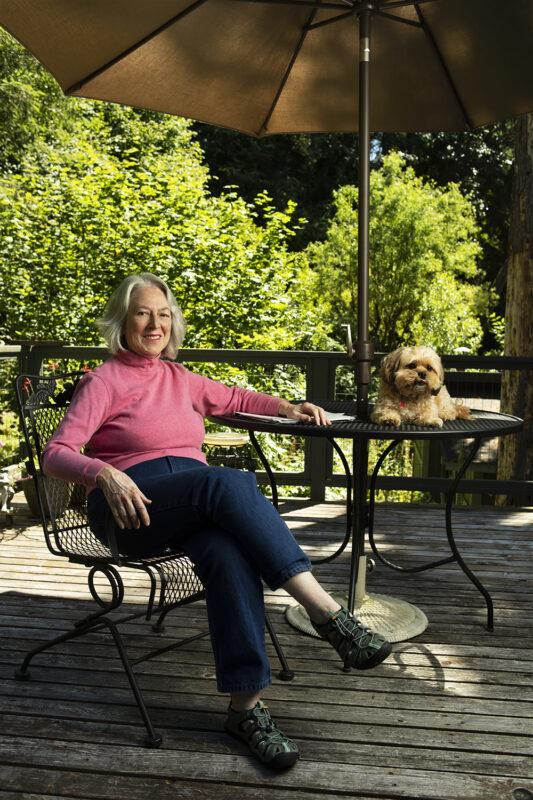Alice Bloch is the author of Mother-Daughter Banquet: A Memoir, the winner of our 2018 memoir contest. Her prolific writing career includes the memoir Lifetime Guarantee, the novel The Law of Return, and publication in several anthologies. She also wrote a column for the Los Angeles Jewish Newspaper, served as a contributing editor of the Lesbian Review of Books, and now reviews classical music, opera, and theater for Seattle Gay News.
Mother-Daughter Banquet: A Memoir explores the concept of motherhood. After losing her mother at the age of nine, Alice Bloch becomes a surrogate mother to her four younger siblings. In turn, a formidable triumvirate of grandmother, stepmother, and aunt step into the maternal role to fill the void in Bloch’s development as a woman and as a writer.
We recently had the opportunity to interview Alice about her writing process. We hope you are as inspired by what she shared as we were.
Enjoy!
There’s a quote by Anais Nin that says, “We write to taste life twice, in the moment and in retrospect.” In what ways did the writing of this book affect you? How would you describe the process of tasting life in retrospect?
I worked on Mother-Daughter Banquet, on and off, for many years, writing and revising and then writing more and revising again. That process affected me profoundly. Events that originally felt too traumatic to think about, let alone write about, became approachable and even healing. I found it possible to accept all parts of my life and to enjoy thinking and writing about them. Here’s one example of the change I experienced: In the chapter “Bringing Her Back,” I describe a recurring dream in which my mother, who died when I was nine years old, was still alive but was being hidden from me. After I wrote that chapter, I never had that dream again.
Memoir is a challenging genre because it tests the limits of our memory. How much actually happened? How much is a narrative recreated in our retelling of the stories? Were there memories that weren’t as clear in your mind? How did you resolve inconsistency or discrepancies?
While writing, I was aware that some memories, particularly those from early childhood, might have been formed as a result of stories I was told by older relatives or family photos I examined. However, in general, my memory is pretty accurate, and I trust it. I interviewed other family members and asked them to read and comment on early drafts, and our conversations helped me to refine the narrative and gave me more confidence in the veracity of the final version. Recently, one of my brothers told me that he’d lost the sound of the voices of loved ones who died long ago, and when reading the dialogue portions of my book, he recaptured the sound of relatives’ voices. I found his response moving and reassuring.
Sometimes the hardest thing about writing is doing the work. Do you have a specific writing routine or ritual that you adhere to get the work done?
When I was writing the first few drafts of Mother-Daughter Banquet, I still had a day job as a technical writer, so I set my alarm early enough to write for an hour each morning before work. My dog Darby always joined me on the couch where I drank my first cup of coffee and did my early-morning writing. If I didn’t feel like writing and did a household chore instead, Darby stood by the couch and barked until I sat down to write. He was my writing coach!
What advice would you give someone who is in the thick of writing a memoir?
Don’t let fear of others’ reactions hold you back when you’re writing the first draft. Write as if no one will ever read the memoir. Then later, you can revise as needed to protect other people–or to protect yourself.
What are your biggest writing challenges?
Getting myself to write is a big one. I seem to wait until the pressure of unwritten thoughts builds up inside me, and then I’m able to write. When I’m writing fiction, pacing and plot are always a challenge.
What’s on your summer reading list?
Right now I’m reading Women Talking, a devastating novel by Miriam Toews. Waiting on my nightstand: On Earth We’re Briefly Gorgeous by Ocean Vuong, Lost Children Archive by Valeria Luiselli, and How To Be Both by Ali Smith.
What writing project are you working on now?
I’m revising Volcano Music, a novel about family, geology, opera, and hula. The novel takes place in Hilo, Seattle, and Ecuador–all places I’m at least a little bit familiar with. The challenges I set for myself in this novel were to write from more than one character’s point of view (there are currently eight) and to write about characters with professions I knew nearly nothing about (several volcanologists, a tuba player, a tax preparer who was once a stripper, a hairstylist, a house stager, and an equestrian).
For a copy of Mother-Daughter Banquet quick here.
Photo by Rick Dahms

